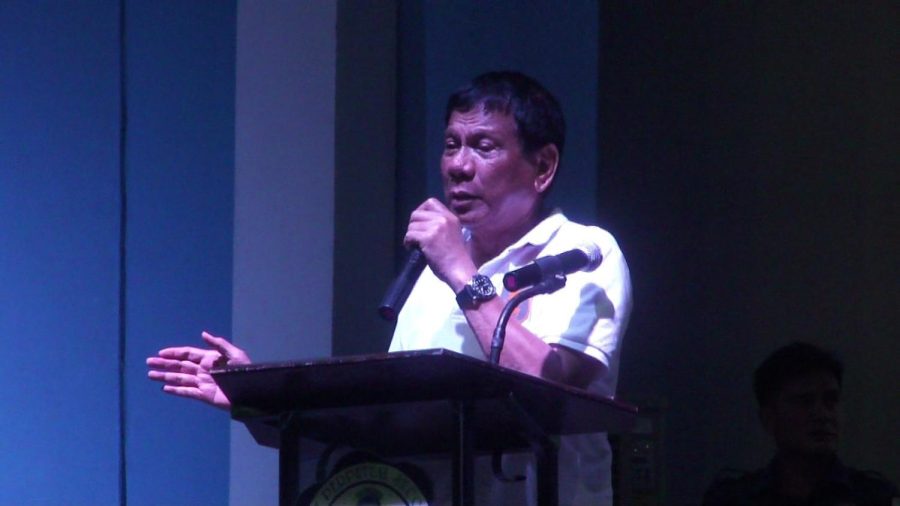Op-ed: Filipino President Duterte’s “War on Drugs” must finally end
Filipino President’s “war on drugs” is deadly and inhumane.
February 20, 2022
When Rodrigo Duterte was elected president of the Philippines in 2016, he sought to keep his campaign promise that he would terminate criminality and illegal drugs through a ruthless “war on drugs.” This “war” has been fueled by a bold vow that he would terminate all criminal activity in the Philippines within three to six months. Steps to end this egregious campaign must be taken to ensure that Philippine citizens are guaranteed their inalienable human rights. On the eve of his election victory, May 9, 2016, the president delivered chilling words that captured the mercilessness of his actions:
There are some seemingly positive effects to Duterte’s war on drugs. Durterte stated that manufacturers, distributors and users of illegal drugs would be punished. Limiting access to illegal substances in this way may decrease drug-related crimes because it would have reduced the number of highs or hallucinations that would have affected drug addicts. The Philippines may become drug-free. If everyone, including the government, local authorities and friends and family of drug users and sellers follows Duterte’s laws, then the Philippines could potentially be closer to achieving the seemingly impossible status of a drug-free nation. But at what cost?
According to BBC News, The Commission of Human Rights estimated in December 2018 that the death count for Duterte’s war on drugs “could be as high as 27,000.” Most of the deceased are young, poor, urban males. The police do not require search or arrest warrants to perform house raids, so suspected drug users are forced to incriminate themselves or potentially face lethal force. Thus, the death count accounts for not only actual criminals, but also innocent civilians who had yet to exonerate themselves. This already alarming statistic does not even account for undocumented mortalities during the Philippine drug war.
Additionally, Reuters reported that “at least 129 children have been killed in the Philippines’ four-year war on drugs.” Investigations unearthed that “38.5 % of the documented child killings were carried out by policemen while 61.5 % were by unknown assailants, ‘some of them with direct links to the police.’”
Fortunately, some organizations have taken action to prevent Duterte from stirring further turmoil. The International Criminal Court is investigating accusations of crimes committed during the war on drugs. Also, the World Organization against Torture and the Children’s Legal Rights and Development Centre pushed the United Nations (U.N.) Human Rights Council to perform an independent commission of inquiry into extrajudicial killings and other crimes in the Philippines in June 2020. The U.N. Human Rights Council was persuaded by a report with detailed recommendations on how to best aid the Philippines.
We and the rest of the international community must make our voices heard, declaring that we will not allow fascism — a path that Duterte is quickly heading toward — to take hold in the Philippines. Furthermore, citizens of the Philippines and elsewhere must actively demonstrate a desire for effective change via rallies, social media, journalism and other platforms. We must educate Filipinos about Duterte’s dishonorable actions so they will not elect a similar president in the future, considering that Duterte shockingly remains highly popular amongst the Philippine population, with a positive rating of 91 percent. Finally, to lend additional support as Northeastern students, we can consider donating to Human Rights Watch, the United Nations Human Rights Office of the High Commissioner and the Movement for Good Governance & Ethical Leadership in the Philippines.
Power can be deadly when abused, and it’s unfortunate that many Filipinos became victimized under Duterte’s campaign. With Duterte approaching the end of his term, Filipinos need to be more careful about who they want as their next leader. Duterte may have appealed to his audience through his remarkable promises, but ensuring Filipino citizens’ safety through a “war on drugs” only caused more turmoil. Through the violence encroaching on their beloved country in the past six years, Filipino citizens still have a chance to lessen their sorrows by brightening their futures with a more empathetic, but still resolute, president.
As Americans, many of us are fortunate that, to a degree, we can take advantage of the freedom of speech established by our democratic Founding Fathers, lending our voices to those whose voices are suppressed. Hence, we must offer assistance to troubled victims within our nation and elsewhere to conserve the deteriorating ties that link humanity as one. When United Nations experts urged President Duterte to stop the extrajudicial killings, Duterte responded that at least half of the Filipino population is involved in drug-related trades and, given that, he was not going to stop the killings until the population is reduced by half.
Other than donations, Northeastern students can spark awareness for the issue by doing their own research on the crisis and educating their peers about their findings. Some reliable resources that students can utilize include Human Rights Watch, Freedom House and the Oxford Human Rights Hub. There are also many Filipino students on campus, particularly in NU Barkada, who you can contact to discover how to best support the Philippines overseas. The Asian American Center also lends tools to help promote visibility and a safe space for Asian American students, so Filipinos who are concerned about their families under Duterte’s merciless rule can find solace through the support of the accommodating resource.
Jethro Ronald Lee is a first-year data science and psychology combined major with a minor in music. He can be reached at [email protected].


















